
India: Trekking in Ladakh Itinerary
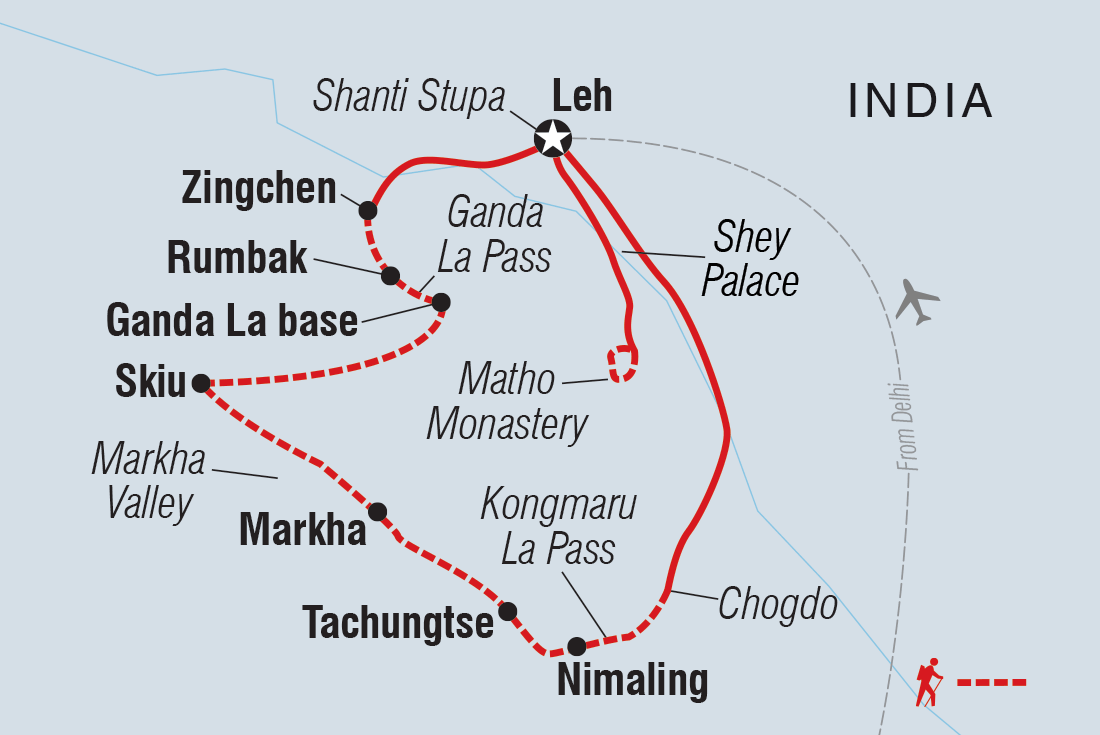


Namaste! Welcome to India. Your trekking adventure kicks off in Delhi – the capital territory of India’s north. Meet your trip leader and new travel buddies at a 6 pm welcome meeting tonight. If you arrive early, there's plenty to do in this wonderfully chaotic city. Maybe wander the streets, sip on your first chai or practice haggling in one of the many markets. Tonight, ask your leader for the best nightlife spots and maybe grab a drink with your group.
Take a flight to Leh this morning – the joint capital of Ladakh, in the Himalayan region, sits framed by the towering peaks of the mountains. When you arrive at the airport, transfer to your hotel, then the rest of your day is free. It might be a good idea to take is easy today as you acclimatise to the altitude (Leh sits at 3500 m above sea level). This afternoon, head out for a gentle orientation walk around the city and its bazaars.
Today after breakfast, you’ll explore Leh’s gorgeous scenery and main sites with your leader. First, head to the Shey Monastery and Palace – this complex, sitting on a high hill, is best known for the one-of-a-kind three-storey statue of Buddha Shakyamuni. Next, you’ll visit the Thiksey Monastery. Also resting on a hill, this site overlooks the Indus Valley with a full view of the Stok Range in the Himalayas. Directly across, you’ll see the Matho Monastery in the village of Matho. Sitting at the mouth of a deep gorge that runs out of the Zanskar Range, this Tibetan Buddhist monastery features red and gold inlays and beautiful views. Later this afternoon, you’re free to wander at your own pace or head back to the hotel and rest.
Today, you’ll hike in and around Leh to continue to acclimatise to the altitude. Time in this city is crucial to properly get used to the high altitude! You’ll set off after breakfast with your leader on a hike around the Leh Valley. Visit the Ruins of Royal Palace – an outstanding example of monumental architecture akin to the Potala of Lhasa, which was built between 1645 and 1695 by the fifth Dalai Lama. Then, visit the Tsemo Monastery for views of Leh and the surrounding villages. From here, continue your walk via Sankar to the recently built Shanti Stupa – this stupa also overlooks Leh and the Stok Range across the valley. If you’re lucky, you might even see the sunset from here!
After breakfast, drive to the small village of Zingchen where your trek begins. Meet your crew, then start the gradual climb to Rumbak. You’ll be walking through epic mountain scenery, blanketed in snow in winter and green grasses in summer. Rare snow leopards live in this area, but the chance of a sighting in summer is very rare. Visit the village Rumbak and meet some members of the local community. Watch the sun go down and maybe help out with dinner tonight.
From your camp site, you’ll take a short trek this morning to the village of Yurutse in the Rumbak Valley. This remote village is home to only one large house and the family here are considered very hospitable hosts. Soak up the natural landscape and watching the stars as they come out, uninterrupted by light pollution.
Today will be one of the longer hiking days of the trip. After breakfast, you’ll climb the 4900-m-high pass of Ganda La passing through base camp. Take in the amazing view and the clean, clear air. It will then be a long descent to Shingo village. When you arrive in the village, continue through a narrow gorge to Skiu in the Markha Valley. Here, there’s a small monastery, part of which is assumed to be over 1000 years old!
Today is another long trekking day, but on mostly flat trails. Walk through the scenic Markha Valley in the middle of the Hemis National Park and check out the old ruins that are on many hill tops here. These show the former importance of this ancient route and little is known about the origin of these ruins! Most likely, they are from the fortresses of Darden, who colonised the first sedentary inhabitants of Ladakh. If you’re lucky, you might see the wild blue sheep on the slopes here or an eagle circling in the sky. Just before the village of Markha, you’ll cross a stream to reach tonight’s campsite. Then, you can set up and settle in for the night.
Your trek continues up to the valley this morning. After a few hours of taking in the wild landscape, you’ll reach Hankar – the last village in the Markha Valley. When you arrive and if you feel up to it, you can take the short but very steep hike up to the small monastery in Tetsa – the view from the top is breathtaking and you’re well rewarded for the effort!
This morning, you’ll trek to the high plateau of Nimaling. When you arrive, you can take in the flat, green plains of the area, surrounded by the white-capped mountains. Nimaling is known as one of the most beautiful high valleys in Ladakh and the views of the 6400-m-high Kangyatze are simply breathtaking. In the evening, the villagers bring their herds of sheep, goats and yaks to these plains to graze in the summer and you can watch them as the sun begins to set! This is your final night with your crew, so soak it up and celebrate an amazing adventure together.
Today, you’ll tackle Kongmaru La – the second pass on the Markha Valley trek. From the pass, take in the sights of Kangyatze one last time, then descend into the long, narrow gorge for spectacular natural scenery. You’ll arrive in Chokdo, then drive back to Leh through green, fertile lands. Spend the night back in the city, celebrating a long and rewarding trekking adventure.
After a leisurely breakfast this morning, you have a free day in Leh to do some last-minute shopping in the bazaar for any souvenirs or gifts you might like to bring home. Tonight, why not grab dinner with your fellow travellers and swap stories.
Take a morning flight to Delhi today. When you arrive, settle in and relax. This afternoon, you’ll have the option to explore Old Delhi on an Urban Adventures sightseeing tour in the afternoon. Wander around the wonderfully chaotic sights and sounds, then later, why not head out with your group for one final dinner together of delicious, local cuisine.
With no further activities planned after breakfast, your trip comes to an end. If you’d like to extend your time in Delhi, just reach out to your booking agent ahead of time. Maybe consider another trip through India, like the Classic Rajasthan (trip code HHSC), India’s Golden Triangle (trip code HHSN) or Premium India Safari (trip code HHPT).
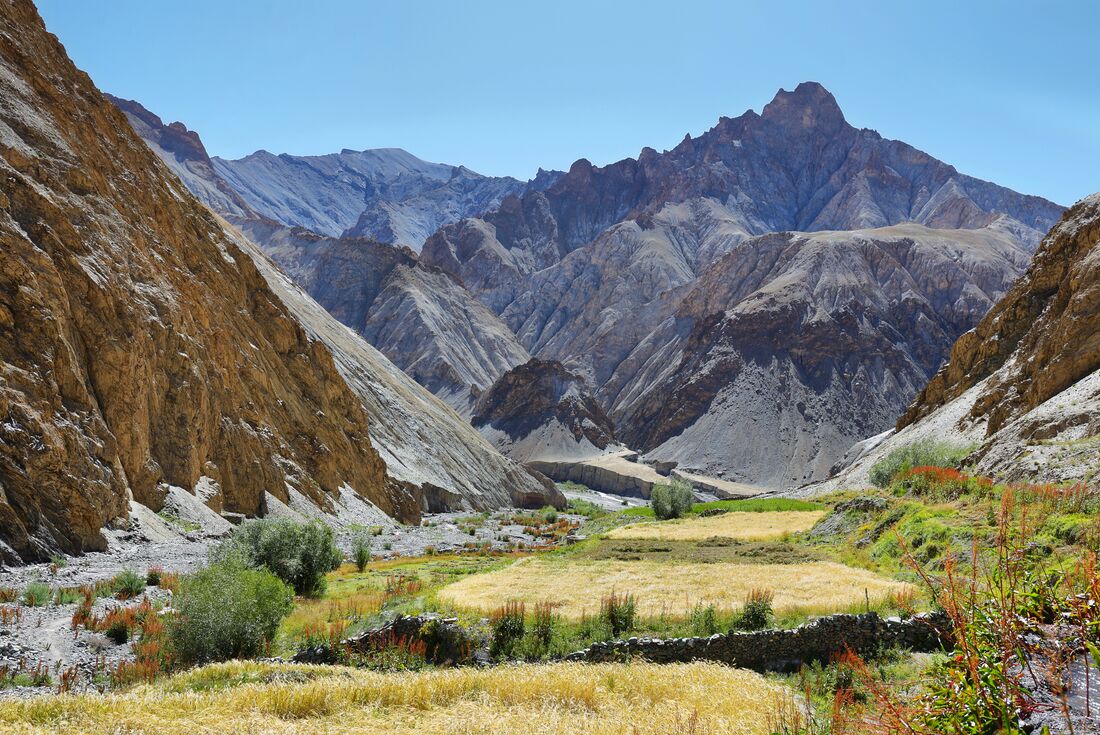
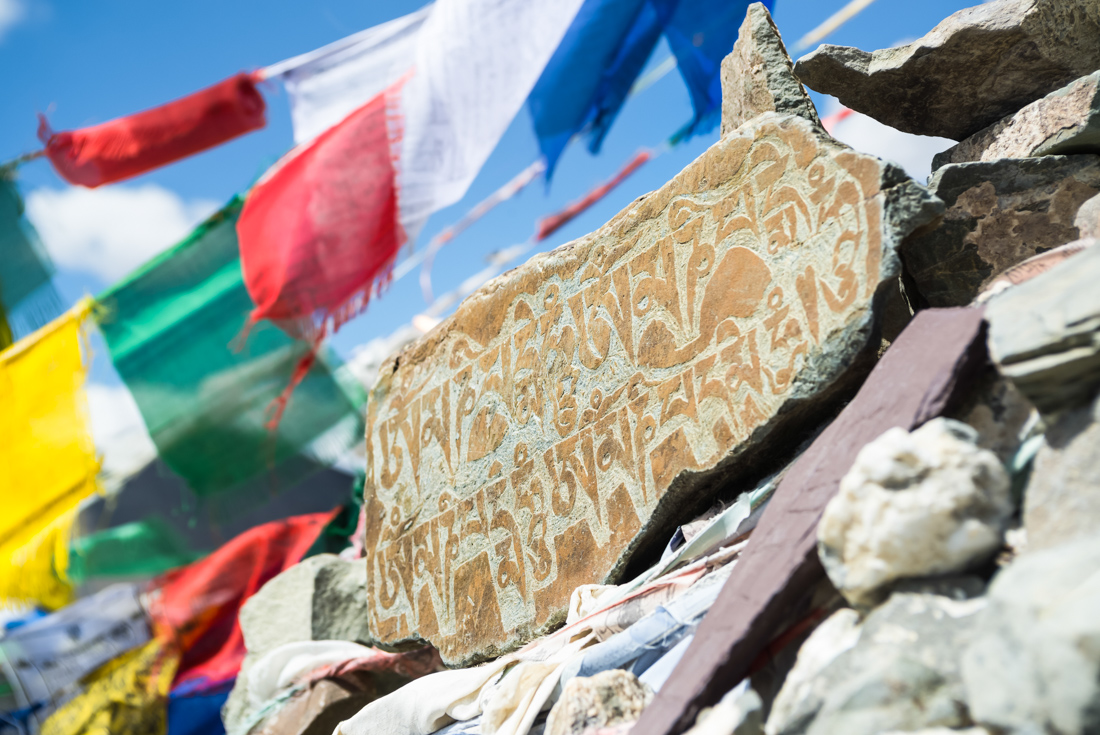
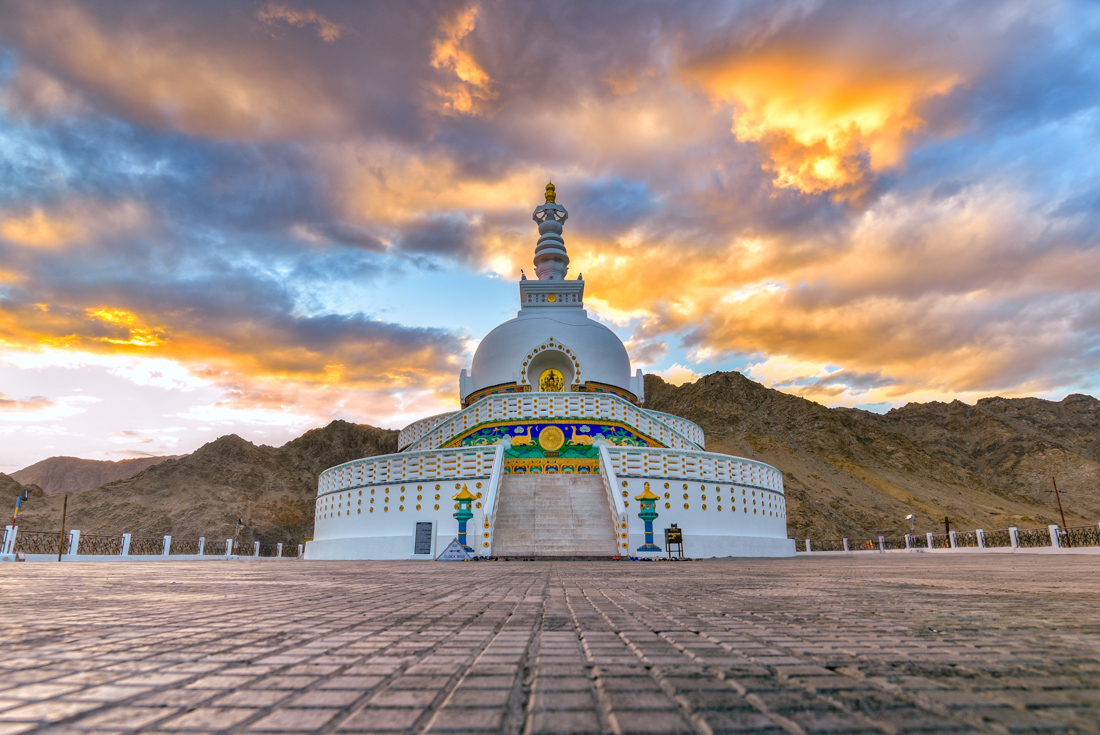
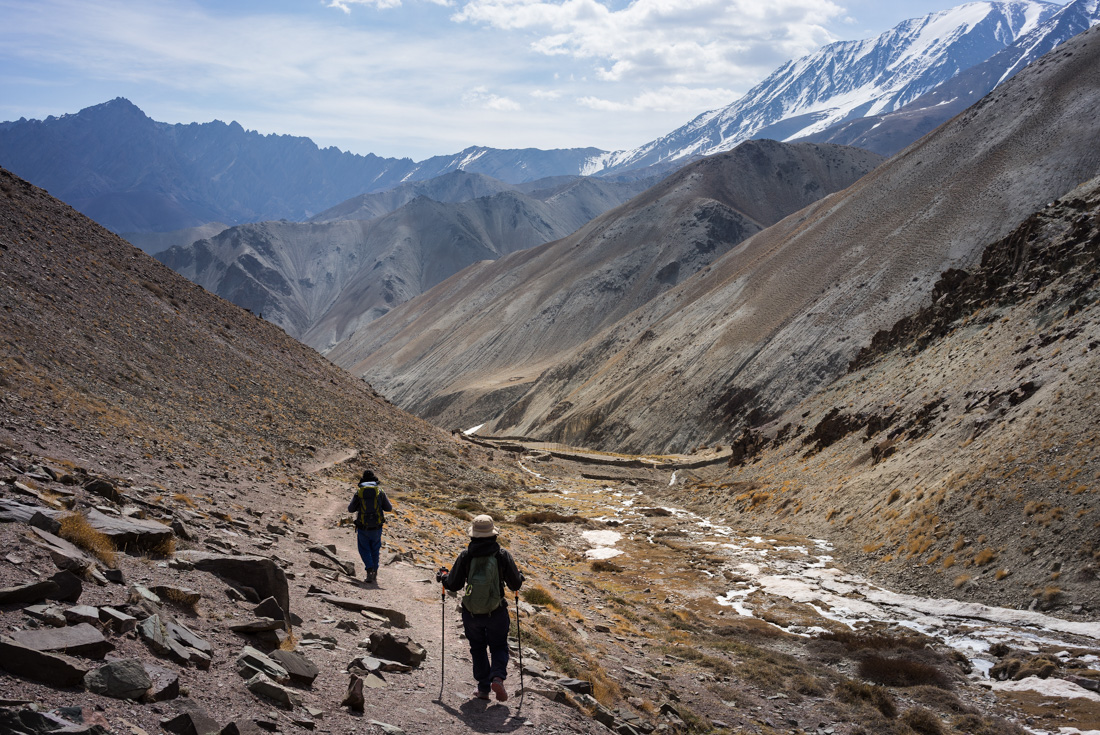
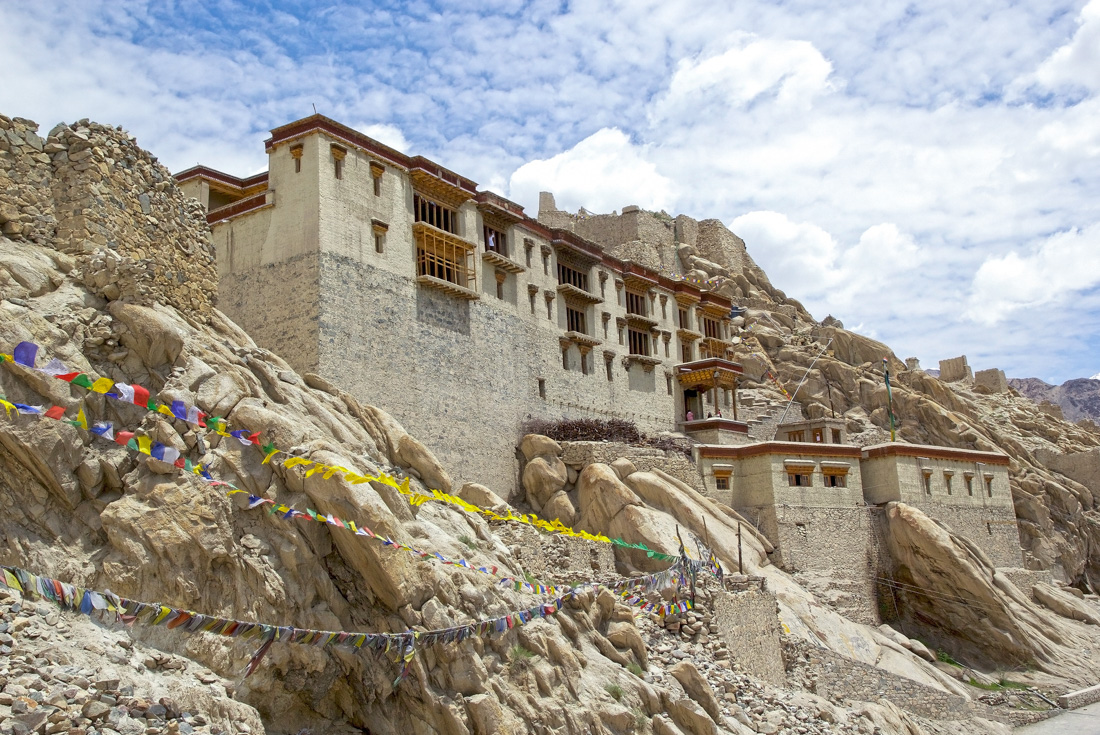
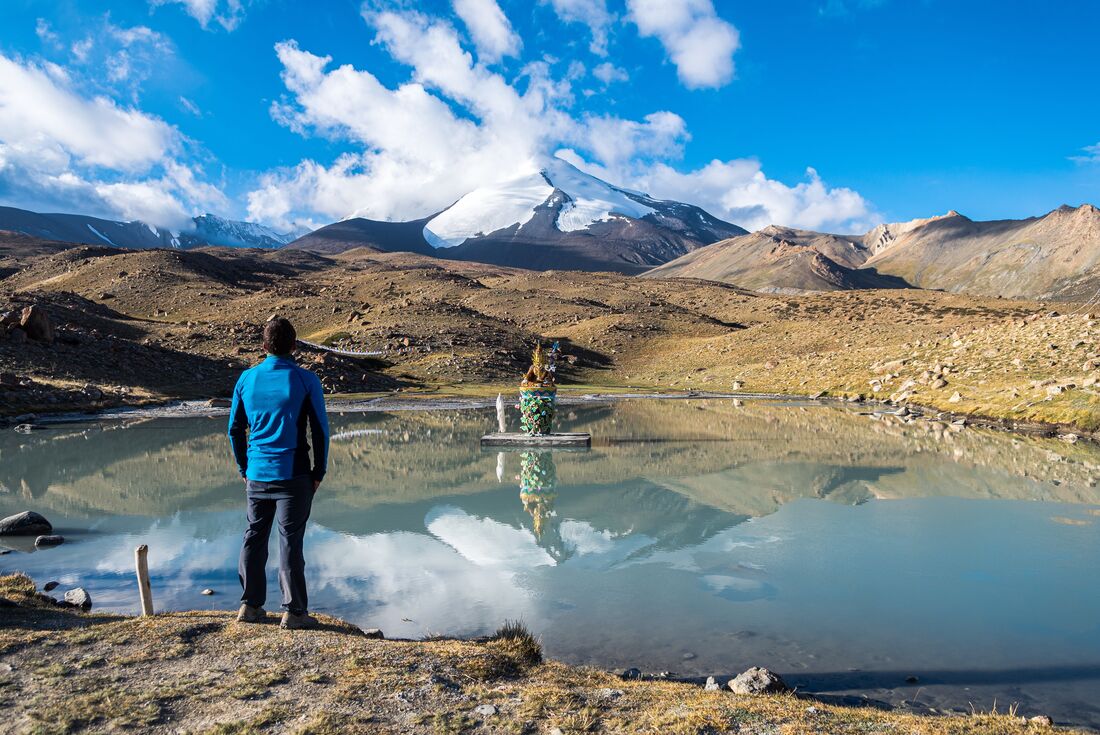
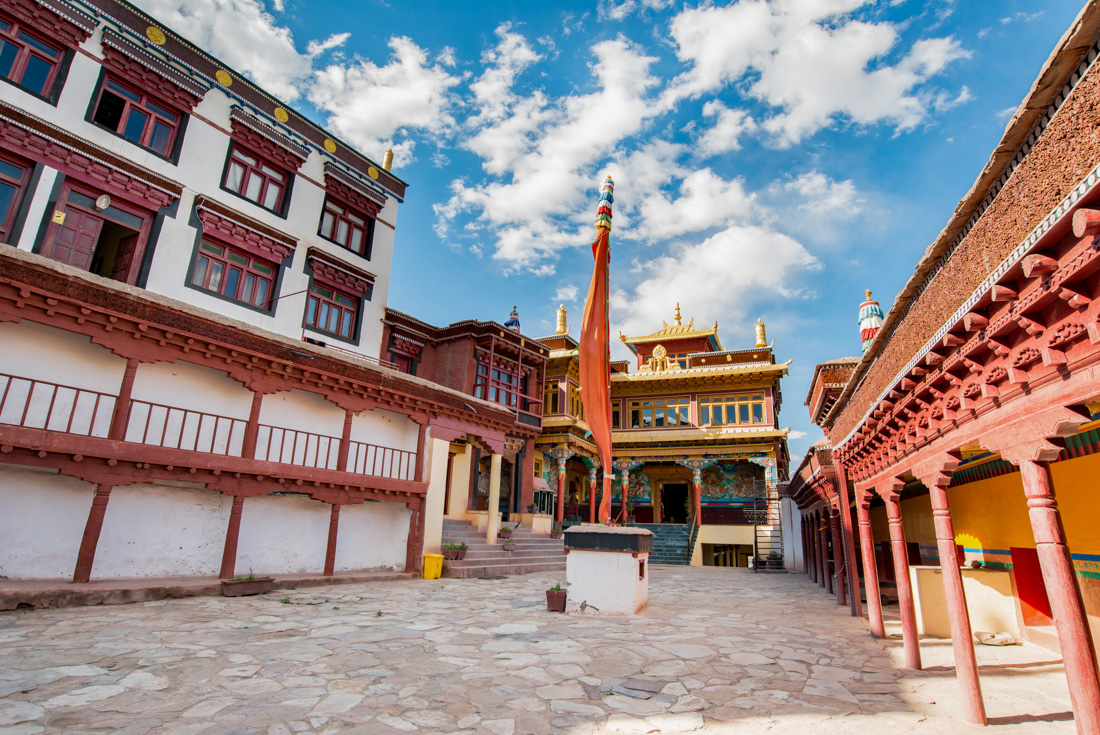
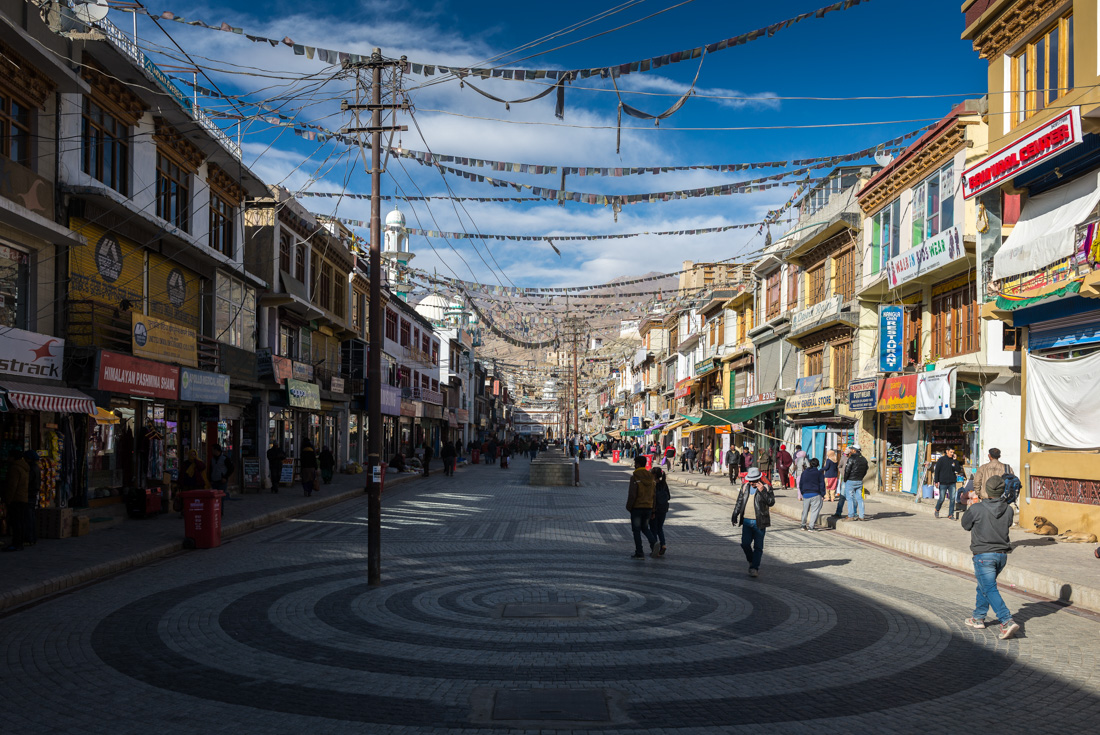
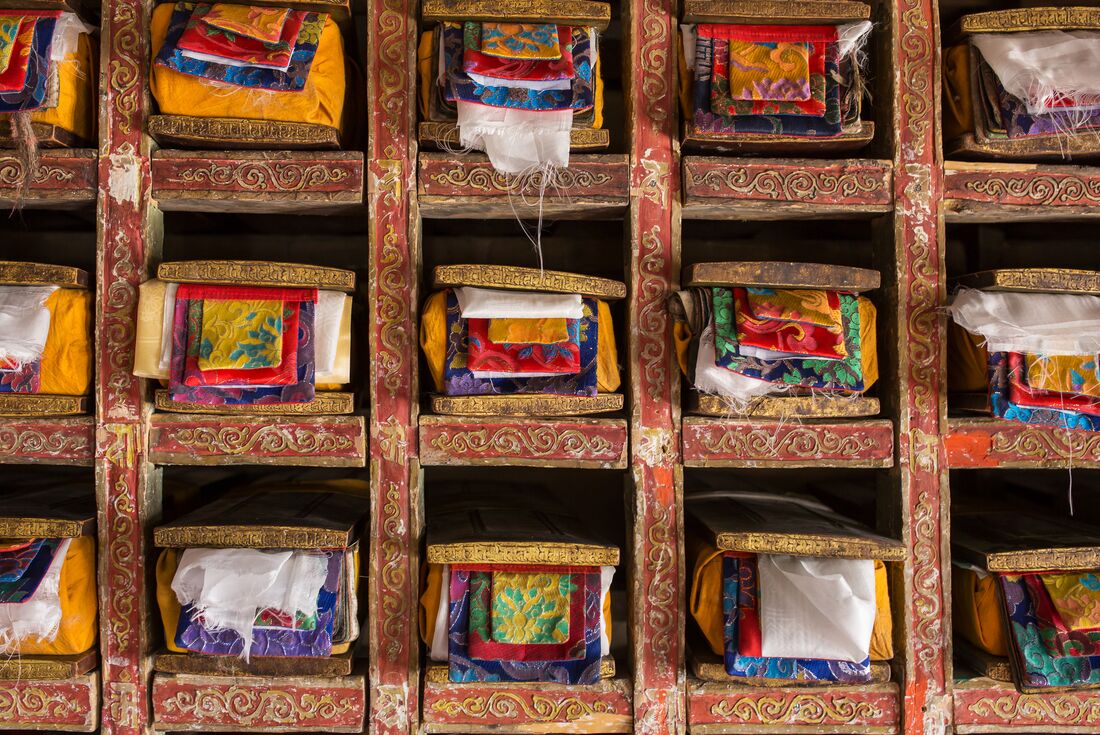
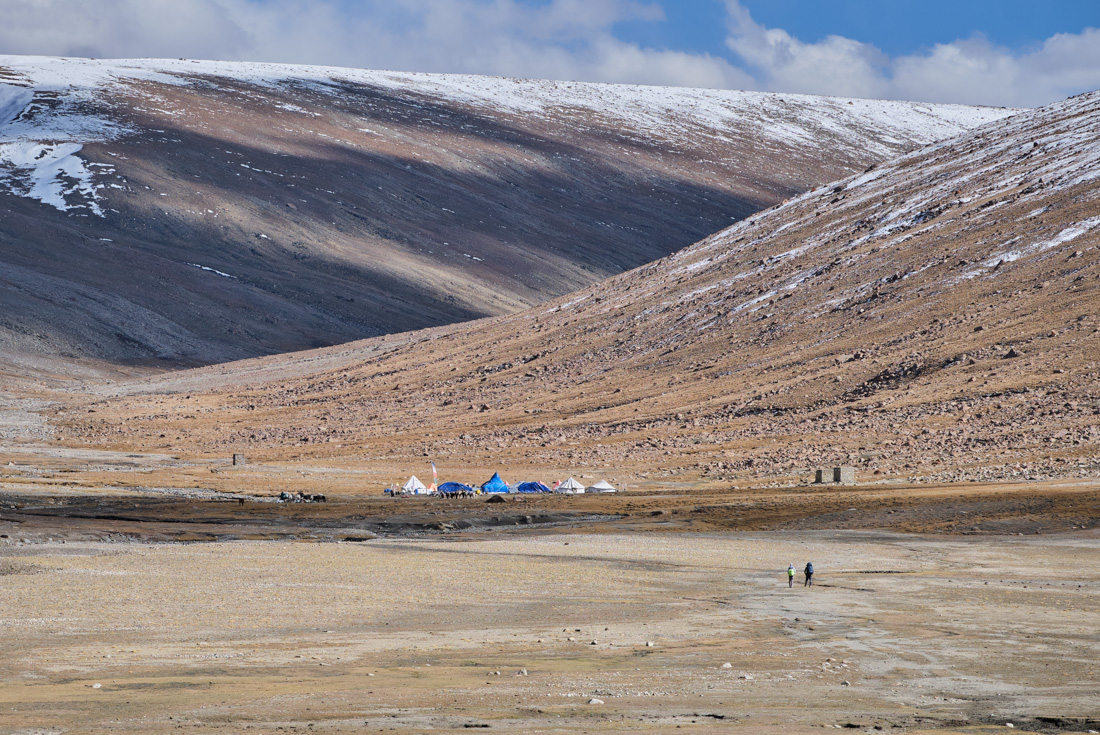
Leh - Orientation walk
Leh - Matho Monastery visit
Leh - Shey Palace visit
Leh - Thiksey Monastery visit
Leh - Valley acclimatization hike
Leh - Ruins of Royal palace visit
Leh - Tsemo Monastery visit
Leh - Peace Pagoda (Shanti Stupa) visit
Rumbak - Zingchen to Rumbak guided trek
Rumbak - Fully supported camping
Rumbak - Expert Licensed professional local guide
Rumbak -15 kgs of porter services per person
Rumbak - Yurutse village visit
Rumbak to Yurutse Guided Trek
Ganda La pass
Skiu - Monastery visit
Yurutse to Skiu Guided Trek
Skiu to Markha Village guided trek
Markha Village to Hankar Guided Trek
Hankar to Nimaling Guided Trek
Kongmaru La pass
Nimaling to Chogdo Guided Trek
Explore the panoramic views of the Markha Valley on this remote trek popular with avid trekkers (due to its proximity to the mountainous city of Leh) and wander through Tibetan Buddhist monasteries and remote villages, backdropped by the Himalayas.
Tap into your leader’s local knowledge during your many discoveries around Leh – also known as Little Tibet or the Land of Lamas.
Enjoy fully supported camping with expert guides and porters. Rub shoulders with the local villagers, known for their hospitality and warmth enjoying home coooked meals along the trek.
Spend a night in Nimaling – one of the most gorgeous high valleys in Ladakh, at 4800 m above sea level – and watch as the locals bring their herds of sheep, goats and yaks to graze in the summer.
Discover old ruins hidden on the hill tops of Markha Village. This shows the former importance of this ancient route and little is known about the origin of these ruins. Here, you might even spot a wild blue sheep on the slopes, or an eagle circling above!
Almondz Hotel, 4/3, Block-4, Near Metro Pillar No- 171 East Patel Nagar, Delhi, 110008, INDIA, Phone: +91 1145580000
Almondz Hotel, 4/3, Block-4, Near Metro Pillar No- 171 East Patel Nagar, Delhi, 110008, INDIA, Phone: +91 1145580000
1. A single supplement is available if you’d prefer not to share a room on this trip. Please speak to your booking agent for further information.
2. You will be trekking on hilly terrain, generally on well-defined paths, walking anywhere between 2–10 hours per day. Altitude may exceed 5000 metres. You will need to be in great health and have excellent fitness.
3. On this tour we travel from Delhi to Leh by plane. In case of unfavorable weather, we may need delay the flight by a day. On the way back, we fly from Leh on Day 13 of the trip. In case of unfavorable weather, we may need delay the flight by a day. Please book your international flights for the late afternoon/evening of day 14 of the trip as the earliest.
4. All trekking permits and National Parks entrance fees are included in the price of the trip.
5. This trip includes a domestic flight as indicated on the trip map. The luggage allowance is 15kg for check in luggage and 7kg for carry on.
6. Please provide your full name exactly as per passport at the time of booking (including any middle names listed on your passport) for flight and entrance tickets. Fees may apply for adding or amending details within 45 days of departure, and in some cases you will be required to cover the cost of issuing new tickets.
While we always endeavour to provide the best possible holiday experience, due to the nature of travel and the areas we visit sometimes things can and do go wrong. Should any issue occur while you are on your trip, it is imperative that you discuss this with your group leader or local representative straight away so that they can do their best to rectify the problem and save any potential negative impact on the rest of your trip.
We recognise that there may be times when your group leader or local representative may not be able to resolve a situation to your satisfaction - if this is the case, please ask the group leader or local representative to speak to their direct manager.
You may also choose to provide details in your online feedback, which we ask you to complete within 30 days of the end of your trip. Please do be aware that it is very difficult for us to provide any practical help after the trip is completed, so informing us while still travelling will give us the opportunity to resolve the issue in real-time., For general contact details please use the following page: https://www.intrepidtravel.com/contact-us, Available for phone call or WhatsApp call on +91 999 900 5019
This is a trekking trip that includes strenuous activities at high altitudes. You will need to be in great health and have excellent fitness to attempt this trip, as well as be committed to training to ensure you are suitably physically prepared for the challenge., This trip visits places as high as 5300 m above sea level, which can cause altitude sickness, regardless of age or physical health. Please see the ‘Medical and health’ section of the Essential Trip Information for more details on travelling at altitude and ensure you are familiar with signs of Acute Mountain Sickness. , This trip involves a full camping experience, giving you access to more remote destinations in close proximity and the joy of experiencing the elements. Expect two-person tents (single supplement available) and sleeping bag. Enjoy fresh home cooked meals at local homestays. , Please read our packing list for required equipment carefully, and remember that you don’t necessarily have to bring all of it with you — you can hire or buy some of it in Leh., On this trip, we use internal flights between Delhi and Leh. We use safety-approved airlines, but please note, due to unfavorable weather conditions, these flights may be delayed, causing some interruptions and amendments to the itinerary.
Explore the panoramic views of the Markha Valley on this remote trek popular with avid trekkers (due to its proximity to the mountainous city of Leh) and wander through Tibetan Buddhist monasteries and remote villages, backdropped by the Himalayas., Tap into your leader’s local knowledge during your many discoveries around Leh – also known as Little Tibet or the Land of Lamas., Enjoy fully supported camping with expert guides and porters. Rub shoulders with the local villagers, known for their hospitality and warmth enjoying home coooked meals along the trek., Spend a night in Nimaling – one of the most gorgeous high valleys in Ladakh, at 4800 m above sea level – and watch as the locals bring their herds of sheep, goats and yaks to graze in the summer., Discover old ruins hidden on the hill tops of Markha Village. This shows the former importance of this ancient route and little is known about the origin of these ruins. Here, you might even spot a wild blue sheep on the slopes, or an eagle circling above!
All group trips are accompanied by one of our group leader or local representative. The aim of the group leader or local representative is to take the hassle out of your travels and to help you have the best trip possible. Intrepid endeavours to provide the services of an experienced group leader or local representative however, due to the seasonality of travel, rare situations may arise where your group leader or local representative is new to a particular region or training other group leader or local representative.
Your group leader or local representative will provide information on the places you are travelling through, offer suggestions for things to do and see, recommend great local eating venues and introduce you to our local friends. While not being guides in the traditional sense, you can expect them to have a broad general knowledge of the places visited on the trip, including historical, cultural, religious, and social aspects. At Intrepid we aim to support local guides who have specialised knowledge of the regions we visit. If you are interested in delving deeper into the local culture at a specific site or location then your group leader or local representative can recommend a local guide service in most of the main destinations of your trip.
TRAVEL ADVISORIES & ALERTS
We recommend that you check your government's foreign travel advisory for the latest information about the destination before you travel. You will also need to ensure that your travel insurance covers you for all destinations and activities on your trip. We also recommend saving the phone number for emergency consular assistance for your government’s consulate in the destination/s you’ll be travelling. Links to travel advisories and any current travel alerts for our trips can be found here: https://www.intrepidtravel.com/travel-alerts
PERSONAL SAFETY
Ensure you have a secure method of carrying your passport, phone, credit cards and cash while travelling such as a money belt. Leave all other high value items, including jewellery, at home Use safety deposit boxes at hotels to store your valuables when available and ensure your luggage is lockable. Be aware of the risk of pick-pocketing and petty theft. Exercise caution when walking at night, don’t walk alone and stick to well-lit streets wherever possible. Be vigilant on public transport and look out for your fellow travellers. Take precautions such as carrying your bag in front of you and never leaving personal items unattended.
LGBTQIA+ TRAVELLERS
Intrepid welcomes all LGBTQIA+ customers on our trips, however we operate in parts of the world that are less accepting. We support LGBTQIA+ customers to travel to these destinations and are committed to ensuring they face no discrimination on any part of the trip we control. We recommend you visit Equaldex (https://www.equaldex.com/) and your government's foreign travel advice for LGBTQIA+ travellers when choosing your trip., https://www.intrepidtravel.com/safety-guidelines
PASSPORT
You’ll need a valid passport to travel internationally and most countries require your passport to have a minimum of 6 months validity, so remember to check the expiry date.
We need your passport information to get everything ready for your trip so it’s important that the information on your booking matches your passport exactly. Please take care to provide the correct details. We recommend carrying a copy of the photo page of your passport while travelling and leaving a copy at home with family or friends.
VISAS & ENTRY REQUIREMENTS
Many countries require a visa and obtaining the correct visa for your trip and any countries you may transit through is your responsibility. We recommend you check your visa requirements as soon as you have booked your trip. This will ensure you have time to prepare your documents and for your visa application to be processed. You can check the entry requirements for your nationality on your government's foreign travel advisories, consular websites or on our page here: www.intrepidtravel.com/visa-entry-requirements, INDIA:
An E-Tourist Visa (eVT) visa is available for selected nationalities. Please follow the instructions at https://indianvisaonline.gov.in/evisa/tvoa.html and complete the application for your eVT. This needs to be completed no less than 4 days prior to arrival. This is the only official visa online site. There are many other mirror sites that are run by visa service companies or scammers and may not be reliable.
Visa requirements for Canada, US and UK customers have changed. Please check your government's foreign travel advisories along with the consular website for India for the most up to date information specific to your nationality and circumstances.
The E-Tourist Visa does not apply to travellers entering India overland. Please check your trip notes if you are crossing a border between India and Nepal, noting that Indian visas are difficult and time-consuming to obtain in Nepal.
Tourist visas are available in Single and Multiple Entry. Be sure to check the date you require a visa from and the length of time you will need to cover, especially if you change countries during your trip.
The following local contact information can be used for your visa application, where relevant:
Intrepid India
25/3 East Patel Nagar
Delhi 110008
Phone: +91 11 4500 6400
, NATIONAL PARKS:
In order to obtain permits and safari bookings for national parks in India, we require a scanned colour copy of the bio page of your passport at the time of booking. Your safari arrangements cannot be completed without this information.
Information not available.
Validity: 01 Jan 2026 to 31 Dec 2026
GENERAL HEALTH
All travellers need to be in good physical health in order to participate fully on this trip. For the safety and wellbeing of yourself and others, if you are unwell prior to travelling, please stay at home and contact us to make alternative arrangements.
When selecting your trip please make sure you have read through the itinerary carefully and assess your ability to manage and enjoy our style of travel. Please note that if in the assessment of our group leader or local representative a traveller is unable to complete the itinerary without undue risk to themselves and/or the rest of the group, we reserve the right to exclude them from all or part of a trip without refund.
You should consult your doctor for up-to-date medical travel information or for any necessary vaccinations before departure. We recommend that you carry a first aid kit as well as any personal medical requirements in their original packaging as they may not easily be obtained while travelling. If you are carrying medication, ensure you check your government's foreign travel advice for any local restrictions or requirements.
, MOSQUITO-BORNE ILLNESSES:
Malaria is a risk in many parts of India, including major cities. Cases of dengue fever are reported, especially in the period after the monsoon. Other mosquito-borne diseases (including Japanese encephalitis, chikungunya fever, and filariasis) also occur. Take preventative measures such as wearing long clothing, using repellent, and being indoors particularly around dusk and dawn. Consult a medical professional regarding prophylaxis against malaria. For more information, see the World Health Organisation's fact sheets: http://www.who.int/neglected_diseases/vector_ecology/mosquito-borne-diseases/en/
AIR POLLUTION:
During winter months (October-February), air pollution levels in parts of India can spike to hazardous levels. Severe pollution can increase the risk of respiratory problems. Those with pre-existing medical conditions, particularly heart and lung conditions, may be especially affected. Your group leader or local representative can assist you to obtain a face mask if required. All customers are encouraged to pack (reusable) face masks as a precaution.
OTHER INFECTIOUS DISEASES:
Water-borne, food-borne, parasitic and other infectious diseases (including meningitis, cholera, typhoid, hepatitis, tuberculosis, diphtheria and rabies) are common in India. Tap water is not safe to drink. Home-made or unlabelled alcohol can be poisonous. Seek medical attention if you suspect food poisoning, if you have a fever or suffer from diarrhea.
ZIKA VIRUS:
India is classified as an ongoing transmission zone for Zika, with confirmed cases in Tamil Nadu and Jaipur. Basic precautions for protection from mosquito bites should be taken by people traveling to Zika transmission areas, especially pregnant women.
INFLUENZA
Cases of influenza A(H1N1) are widespread in India during winter with a number of recent cases in Rajasthan. Discuss influenza vaccination requirements with your doctor or a travel health professional before departing and maintain good hygiene practices by covering your mouth and nose with a tissue when coughing, and washing your hands regularly. For more information, see the World Health Organisation's fact sheets: https://www.who.int/news-room/fact-sheets/detail/influenza-(seasonal), ALTITUDE SICKNESS
This trip travels to altitudes where there is a risk of Acute Mountain Sickness (AMS), a potentially life-threatening condition if left untreated. AMS can affect anyone, regardless of age, fitness or experience. There is a higher risk of AMS for those who have had it before, those who drink alcohol and those who take part in strenuous exercise before correctly acclimatising.
As some medical conditions or medications may increase your susceptibility, we strongly advise discussing any pre-existing conditions, your participation in this trip, and preventative medications such as Diamox with your doctor.
Our itineraries are carefully designed and risk-assessed in line with our Altitude Safety Policy and current best practice standards for safe acclimatisation. However, AMS can still occur, and it’s essential to be aware of the signs and symptoms. These include nausea, dizziness, shortness of breath and headaches.
Our experienced leaders are trained in AMS awareness and first aid and will conduct regular checks to help you monitor your health throughout the trip. They have full authority to make decisions regarding your participation based on medical needs or AMS symptoms, including delaying or stopping your ascent if necessary.
More information about Altitude Sickness can be found here: https://www.intrepidtravel.com/au/altitude-sickness
While travelling with us you'll experience the vast array of wonderful food available in the world. Your group leader or local representative will be able to suggest restaurants to try during your trip. To give you the maximum flexibility in deciding where, what and with whom to eat, generally not all meals are included in the trip price. This also gives you more budgeting flexibility. As a rule, our groups tend to eat together to enable you to taste a larger variety of dishes and enjoy each other's company. If you have dietary requirements and/or food allergies, please let your booking agent know prior to departure.
SPENDING MONEY
When it comes to spending money on the trip, every traveller is a little different. You know your spending habits better than we do, so please budget an appropriate amount for things like optional meals, drinks, shopping, optional activities, and laundry. Make sure you have read the itinerary and inclusions thoroughly so you know what is included in the trip price and what you may need to pay for while travelling. , INDIA
The official currency of India is the Indian Rupee (INR). Its symbol is ₹. ATMs that accept international debit and credit cards are widely available in larger cities and towns. Cash shortages at ATMs can be a problem in rural areas. The use of credit cards can be restricted, mainly to major hotels, shops and restaurants. Make sure you carry sufficient cash to cover your needs when travelling outside larger cities and towns.
INR is a blocked currency, which means it can only be obtained in India and cannot be exchanged outside India. Ensure you use or exchange all INR before leaving the country.
, TIPPING
Tipping can be an appropriate way to recognise great service when travelling. While it may not be customary in your home country, it is an entrenched feature of the tourism industry across many of our destinations and is greatly appreciated by the people who take care of you during your travels. It is always best to avoid tipping with coins, very small denomination notes, or dirty and ripped notes, as this can be regarded as an insult rather than the goodwill gesture it is intended to be., OPTIONAL TIPPING KITTY
On Day 1 of your trip, your group leader or local representative may discuss with you the idea of operating a group tipping kitty, whereby everybody contributes an equal amount and your group leader or local representative distributes tips for drivers, local guides, hotel staff and other services included on your trip. Participation in this kitty is your choice, and you are welcome to manage your own tipping separately if you prefer.
The group leader or local representative will keep a running record of all monies spent, which can be checked at any time. Any funds remaining at the end of the trip will be returned to group members. These tips to suppliers are for great service and are in addition to the regular costs paid for the services supplied.
The tipping kitty excludes tips for your group leader or local representative., Optional tipping kitty for this trip: INR 6000 per person., YOUR GROUP LEADER OR LOCAL REPRESENTATIVE
Tipping your group leader or local representative is highly appreciated if you feel they’ve provided outstanding services throughout your trip. The amount is entirely a personal preference; however, as a guideline, the recommended amount is 4-7 USD or EUR per traveller per day (in a currency relevant to your destination). Of course, you are free to tip more or less as you see fit, depending on your perception of service quality and the length and involvement of your group leader or local representative on your trip., CONTINGENCY FUNDS
We try to plan for every eventuality, but there are still some things beyond our control. We reserve the right to change an itinerary after departure due to local circumstances or a Force Majeure Event. In such emergency circumstances, the additional cost of any necessary itinerary alterations will be covered by you. Please note we are not responsible for any incidental expenses that may be incurred as a result of the change of itineraries including but not limited to visas, vaccinations or non-refundable flights. Make sure you have access to an extra US$500 for emergencies (e.g. severe weather, natural disasters, civil unrest) or other events that result in unavoidable changes to the itinerary (e.g. transport strikes or cancellations, airport closures). Sometimes these things necessitate last-minute changes to enable our trips to continue to run, and as a result, there may be some extra costs involved. The recommended amount is listed in USD for the relatability of universal travellers, however, local currency may be needed once in the country to cover these costs., COMMISSIONS
Intrepid understands that the receipt of commissions in exchange for recommending particular shops or services is ingrained in the culture of the tourism industry. For this reason, we have established a centralised fund for contributions from recommended suppliers so these can be collected and distributed back into the business. Actively managing the receipt of commissions helps us maintain the level of quality you expect on one of our trips. Travel is always an adventure so Intrepid cannot explicitly guarantee the quality of a product but we aim to provide the best value trips in the market. Please let us know via the feedback form completed after your trip if we are successfully meeting - or exceeding - this objective.
Most travellers prefer to take a small to medium wheeled suitcase, which is a great size for the packing capacity in our private vehicles. Whatever you take, be mindful that you will need to be able to carry your own luggage, handle it at airports, take it in/out of accommodation and perhaps even walk short distances. We recommend you pack as lightly as possible.
If your trip includes travelling on overnight trains or primarily using public transport, the smaller your luggage, the easier it will be to store under or above bunks. Large suitcases may not be able to be taken on board. A lockable bag or small padlock for your bag will be useful, especially when travelling on public transportation as well.
When you're exploring during the day, you'll also need a day pack/bag to carry water, a camera, a jacket and activity-specific items like a swimsuit, a waterproof pouch/bag for your phone, or hiking shoes.
Below we have listed the essentials for this trip:, https://www.intrepidtravel.com/packing-list, LUGGAGE ALLOWANCE ON DOMESTIC INDIA FLIGHTS:
Please note that internal flights in India carry a weight restriction of 15kg per person for checked luggage and 7kg for carry on. Excess weight will incur extra cost, payable direct to the airline, As well as your underwear, toothbrush and other items you always need to pack for travel, below are some items that you specifically need for this trip.
https://www.intrepidtravel.com/packing-list
MAIN LUGGAGE
You need to bring your main piece of luggage as well as a small to medium backpack for day’s walks (20-25 litres). One with waist strap would be most comfortable for all included hikes.
Please note, your main luggage is going to be transported from one camp to the other while you walk. Total weight of your main bag must not exceed 15kg and it should be packed in a soft bag/duffle bag or a rucksack. Any excess luggage can be stored in Leh for the duration of the trek, at extra cost.
ESSENTIALS
- Day pack: for carrying essentials during activities
- Trekking clothing: A mixture covering lightweight clothing and some warm layers is recommended. Your activities will take place in high mountans, where weather may change quickly. Lightweight, comfortable, and quick drying clothes for the activities are best. Laundry facilities may not be available on every day basis, so make sure you have a few cycles of clothes.
- Sturdy hiking boots with a good grip, ankle support and waterproof membrane that are comfortable to walk for an entire day
- 3 season sleeping bag (comfort rated min -5°C). Can be hired in Leh.
- Walking Poles for support on steep uphill sections and longer descents. Can be hired in Leh.
- Comfortable shoes for shorter beach walks or evenings spend around accommodation
- Sport sandals
- Light jacket, fleece and base layers
- Warm down jacket
- Warm hut and gloves
- Wind and waterproof jacket
- Waterproof over trousers
- Breathable, non-cotton hiking t-shirts
- Long hiking pants or zip-offs
- Nylon hiking shorts
- Scarf or buff
- Water bottle or bladder: you will need water during activities and it’s best to avoid buying unnecessary plastic.
- Sun protection: sunscreen, sunglasses, sunhat or bandana
- Torch/flashlight/headtorch
- Toiletries
RECOMMENDED
- Personal medical kit. A larger kit will be on hand with your leader, but we recommend you carry items such as mild pain killers, antihistamine tablets and any personal medication you may need
- Ear plugs & eye mask
- Camera with spare batteries/power bank: You will have access to power to recharge your electrical items daily
- Travel eco-friendly wipes/hand sanitizer
OPTIONAL
- Swimwear
- A good book, a journal and music player
VALUABLES
Please try to avoid bringing unnecessary valuables. It’s also recommended to bring a copy of all important documents e.g. air tickets, passport, vaccination certificate, etc. and keep the copies separate from the originals. While not valid, a photocopy makes it very much easier to obtain replacements if necessary.
If you need some further tips for packing, you can always check out our ultimate packing list.
WATER BOTTLE
Please bring your own water bottle to refill along the way. The sale of bottled water contributes to an enormous environmental problem around the world. In addition to the water in bottles, the production of a 1 litre plastic bottle takes 2 litres of water and 200ml of oil. A large proportion end up in limited landfill or discarded in waterways and natural environments.
During summer in Ladakh, daytime temperatures range from 10°C to 25°C. However, nights in Ladakh can get chilly with temperatures dropping as low as 5°C. The summer season in Ladakh offers comfortable weather for trekking.
Intrepid won't tolerate any kind of violence, harassment (whether physical, verbal or sexual), or disrespect toward fellow travellers, our teams or local communities.
To ensure the wellbeing of everyone on the trip, decisions made by your group leader are final.
Romantic relationships between travellers and group leader or local representative are not permitted while on trip.
Any behaviour that prevents your leader from continuing the itinerary as planned, breaks local laws or opposes any of these guidelines may result in Intrepid denying your booking or removing you from the trip.
If something concerns you during your travels, please speak to your group leader immediately. Alternatively, you can contact us on the emergency contact number detailed in the Problems and Emergency Contact Information section of this Essential Trip Information.
The style of accommodation indicated in the day-to-day itinerary is a guideline only and may change. On some occasions, alternative arrangements may need to be made due to the lack of availability of rooms in our preferred accommodation. In these cases, we will use a similar standard of accommodation.
Throughout the trip, we request that our properties prepare rooms in time for our arrival, especially if we're arriving prior to normal check-in time. However, this isn't always possible which means we won't be able to check-in immediately on arrival at some hotels. Instead, we can store our luggage and explore our new destination or on some trips, have use of shared day rooms until all rooms are available.
, Our accommodation in Delhi and Leh is Original standard hotels. Whilst on the trek, seven nights will be spent camping in spacious two-person alpine tents. It is possible to hire a single tent for an additional cost.
TRANSPORT IN INDIA:
Main roads in India are usually very busy with an assortment of vehicles from the biggest trucks (who always have right of way) down to bikes (and animals!). Overtaking on blind corners at speed is common as is the total use of the horn as a form of communication. Our leaders have complete authority to remove groups from local transport if the driver is not driving safely. Drivers of our private vehicles are experienced and well trained. if you are uncomfortable with your driver, please always let your tour leader know immediately. Please ensure you wear your seat belt at all times.
TRAVEL TIMES:
Distances in India do not reflect the driving time and to cover 100km may take much longer than you would expect at home, even if much of the route is on a highway.
TRAINS:
India has a massive network of trains and millions of people travel by rail every day. Trains often travel the length of the country over several days. Trains are a great way to see the countryside and get you away from the busy road system. Delays and cancellations are common on trains. Your tour leader will check the train status to see if there are delays and will do their best to keep you informed of any changes.
From December to February, delays are more common, especially in the north of the country due to fog. It’s not uncommon for trains to be delayed for up to 12 hours. On occasion, your trip will may to be rerouted to allow for these delays. Your tour leader in conjunction with our local office will advise any changes to the itinerary.
The Indian Railway system is one of the largest railway networks in the world and quite complex. Seat allocation is completely computerized on a centralized reservation system and we do not have control over seat allocations. Despite booking tickets months in advance of a departure your group's seats, or sleeping berths on overnight trains, maybe spread out within one carriage or multiple carriages of the same class. There’s a chance you’ll be sharing a compartment with local travelers of either gender.
For a detailed look into the experience of travelling by overnight trains read more here: https://www.intrepidtravel.com/adventures/india-trains-guide/
AUTO RICKSHAWS:
On this trip, we travel on the local style of transport called an auto-rickshaw. These small, motorised three-wheeled vehicles are a common form of transport in India and do not have seatbelts.
FLIGHTS:
Airlines in India are of excellent quality. Airports are becoming more modern (especially in the major and tourist cities). To enter the airport, you must have a copy of your flight ticket and passport. Schedule changes and delays do occur, especially when weather conditions make visibility poor.
Travel insurance is compulsory on all our trips for those travelling internationally. We require that, at a minimum, you are covered for medical expenses, including emergency repatriation. If you are travelling within your home country or region, please confirm before travel that you are entitled to access the public medical system easily should an accident occur. We strongly recommend all travellers have a policy that also covers personal liability, cancellation, curtailment and loss of luggage or personal effects. For international trips, you will not be permitted to join the group until evidence of travel insurance and the insurance company's 24-hour emergency contact number has been sighted by your group leader or local representative.
If you have credit card insurance, your group leader or local representative will require details of the participating insurer/underwriter, the level of coverage, policy number, and emergency contact number, rather than the bank's name and your credit card details. Please contact your bank for these details prior to arriving in-country.
For travellers who reside within the European Union, Switzerland or the USA, the requirement to purchase travel insurance cannot be compulsory. However, the purchase of travel insurance is still highly recommended, and each country you visit may have its own specific entry requirements. For example, some mandate travel health insurance for all foreign travellers, regardless of their nationality. Travellers from the European Union, Switzerland or the USA who decline travel insurance when travelling outside their home region must sign a Travel Insurance Waiver Form at the Group Meeting, recognizing personal responsibility for emergency medical and repatriation costs should they arise.
For assistance with travel insurance or other services, please visit the link below:
, https://www.intrepidtravel.com/booking-resources/our-services
As you travel on a group trip you will be exposed to all the pleasures and maybe some of the frustrations of travelling in a group. Your fellow travellers will probably come from all corners of the world and likely a range of age groups too. We ask you to be understanding of the various needs and preferences of your group - patience with your fellow travellers is sometimes required for the benefit of everyone's travel experience. Remember too that you have responsibilities to the group. If you are requested to be at a place at a certain time, ensure that you don't keep the rest of the group waiting. We have found time and time again that the very best trips we operate are those where the dynamics within the group work well - this takes just a little effort on your part. Due to privacy reasons, we are unable to provide you with contact details and any personal information about your fellow travellers booked on your trip prior to departure., SOLO TRAVELLERS
On our trips, rooming is organised on a twin-share basis. We pair up solo travellers with another traveller of the same gender, as per the gender marker on each of their passports.
We also offer an optional single supplement on most trips for travellers who prefer to have their own room. This only applies to accommodation during the tour. Pre-trip and post-trip accommodation booked through us will always be on a single-room basis.
On a small selection of trips some accommodation will be open-gender and multishare, such as a felucca in Egypt or an overnight train in Vietnam. Please review the Accommodation section of the Essential Trip Information for details about your trip.
LGBTQIA+ TRAVELLERS
We strive to create a safe and inclusive environment for everyone. If your gender identity differs from what is indicated on your passport, please contact us so that we can discuss rooming options with you.
ITINERARY CHANGES
Our itineraries are updated regularly throughout the year based on customer feedback and to reflect the current situation in each destination. The information included in this Essential Trip Information may therefore differ from when you first booked your trip. It's important that you review this information prior to travel so that you have the latest updates. Due to weather, local conditions, transport schedules, public holidays, political unrest or other factors, further changes may be necessary to your itinerary once in-country. Your group leader or local representative will keep you up to date with any such changes once your trip is underway and has the authority to amend or cancel any part of the trip itinerary if deemed necessary due to safety concerns.
, OPTIONAL ACTIVITIES
A selection of optional activities that have been popular with past travellers are listed in the day-to-day itinerary. This isn't an exhaustive list and should be used as a guide only for some of what might be available. Prices are approximate, are for entrance fees only, and don’t include transport to and from the sites or local guides unless indicated. All activities are subject to availability, and maybe on a join-in basis. It may not be possible to do all the activities listed in the time available at each destination, so some pre-planning for what you are most interested in is advised. When it's recommended that travellers pre-book these activities, look for a note in the Special Information section of the day-to-day itinerary. For most, they can either be organised independently on the day, or let your group leader or local representative know you are interested at the Welcome Meeting and they can assist.
Where activities are considered medium or high risk, we work with operators whose safety and credentials we have sighted and assessed. Although it is possible that you may find the same activity cheaper with another operator on the ground, we cannot vouch for the safety or quality of that operator. Medium and high-risk activities not listed above have not been assessed by us and as such our staff and group leader or local representative are unable to assist you with organising these activities. Activities that contravene our Responsible Travel policies are also not listed. Please remember that the decision to partake in any activity not listed is at your own discretion and risk.